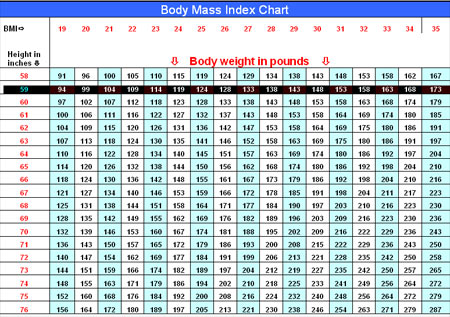This feature is part of HealthJockey’s multi-part fitness feature which comprises the importance of fitness, work-outs, methods of exercise including weight training. It’s all about the numbers in this article. If you are serious and keen to lose weight, you should keep track of calories lost/gained, when exercising regularly.
The table above is a Body Mass Index chart which depicts what your BMI is based on your height and weight.
Anything above 24 is considered overweight, above 30 is obese. The higher up you are from 30, the more lucrative business you bring for the medical profession!
All form of exercise, activity and weight control revolve around a central truth; that of calories. If the amount of calories you consume regularly exceeds the amount of calories you burn via various activities, you are bound to gain weight.
Calories are burnt every second of your life; they are burnt during work, on the couch in front of the idiot box and even while sleeping. Yet people tip the balance and gain extra weight!
Most of the literature on weight loss will offer you complex calculations on how many calories you are burning and how many you should consume and through what food source. Apart from looking extremely lame and increasing your chances of developing obsessive compulsive disorder, it is not accurate. Of course, you can get a rough estimate, give or take a few calories (or alternately, a few slices of bread) but the basic calculation of calories burnt by a certain activity and from different types of food is an ideal and generalized figure.
If a gram of protein gives x no of calories, that is in conditions when it is completely broken down and absorbed and all the energy is available to the body for work. This almost never happens. So what we suggest is along with better eating habits, you adopt a form of exercise that best suits you. In a few weeks time, you would be able to tell if it is showing results. You can then modify your regimen accordingly. This is; of course, assuming you don’t stock up empty calories with mass-marketed junk food.
Again, body types also play a part. But don’t run with that excuse. The ideal weight varies from person to persons as per his metabolism and lifestyle. Your neighbor might be able to carry off a few extra kilos if he is a teetotaler and never eats out side but those same few kilos can bring you down with your week-end and sometimes, mid-week binge parties. To get a rough idea, one may refer to body-mass index:
This would give you a perspective and a target. If you find yourself too much to the right of the table, leave that doughnut right now!
On a more serious note, we cannot stress enough on the importance of consulting your physician before starting a strenuous exercise routine, especially if you have conditions of blood pressure and diabetes.
By Punit Pania

